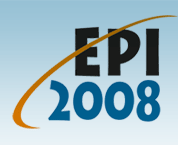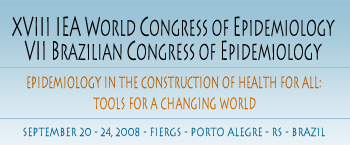We extend our warm welcome to the participants in this largest ever
IEA Congress. We will have 16 keynote lectures, 43 symposia, 25 lectures
and 28 mini-symposia, as well as the traditional IEA regional workshops.
Over 5,000 abstracts will be presented, either in poster or oral sessions.
Additionally, we created 12 special mini-symposia from selected abstracts.
Delegates from diverse continents – represented by the 5 keys
in Clara Pechansky´s Recital – will discuss key issues for
Epidemiology in the Construction of Health for All: Tools for a Changing
World.
The term Construction synthesizes the role of epidemiology in building
knowledge for improving public health. In our program, this theme will
include discussions on what colleagues from low and middle income countries
can learn from, as well as teach colleagues from high-income countries;
and on how epidemiology can inform public health to improve health systems.
The interfaces between epidemiology, advocacy and policy will receive
special attention.
As the Alma-Ata declaration is 30 years old this September, the concept
of Health for All in the conference theme has received great attention.
The Brazilian experience with a universal national health system, completing
in 2008 two decades of existence, will be spotlighted. But the theme
goes well beyond Brazil, covering issues such as the social determinants
of health, the Millennium Development Goals, primary health care, and
how to eradicate health inequities in terms of gender, ethnic group
and socioeconomic position.
The essential methodological role of epidemiology – expressed
by the term Tools – will be discussed within the context of new
statistical methods, updates on nutritional epidemiology, advances in
the design of prospective studies and increasing options for data linkage,
to name just a few topics. The keynote of Nubia Munoz – who will
receive the first Sir Richard Doll Prize – will describe the superb
use of a whole array of epidemiological tools in establishing the causal
role of human papilloma virus in cervical cancer, from early etiologic
research to the development and testing of preventive vaccines.
Finally, the rapid progress that Brazil is undergoing, with its many
inherent contradictions, will provide a backdrop to the theme of a Changing
World. Our program highlights major world changes occurring in the early
21st Century. The demographic, nutritional and epidemiological transitions,
global environmental changes, new pandemics, population ageing and urban
violence will be discussed in several sessions. Our next IEA president,
Neil Pearce, will specifically address the theme of epidemiology in
a changing world.
Maria Inês Schmidt, Bruce B. Duncan and Cesar
Victora
For the Organizing Committee



